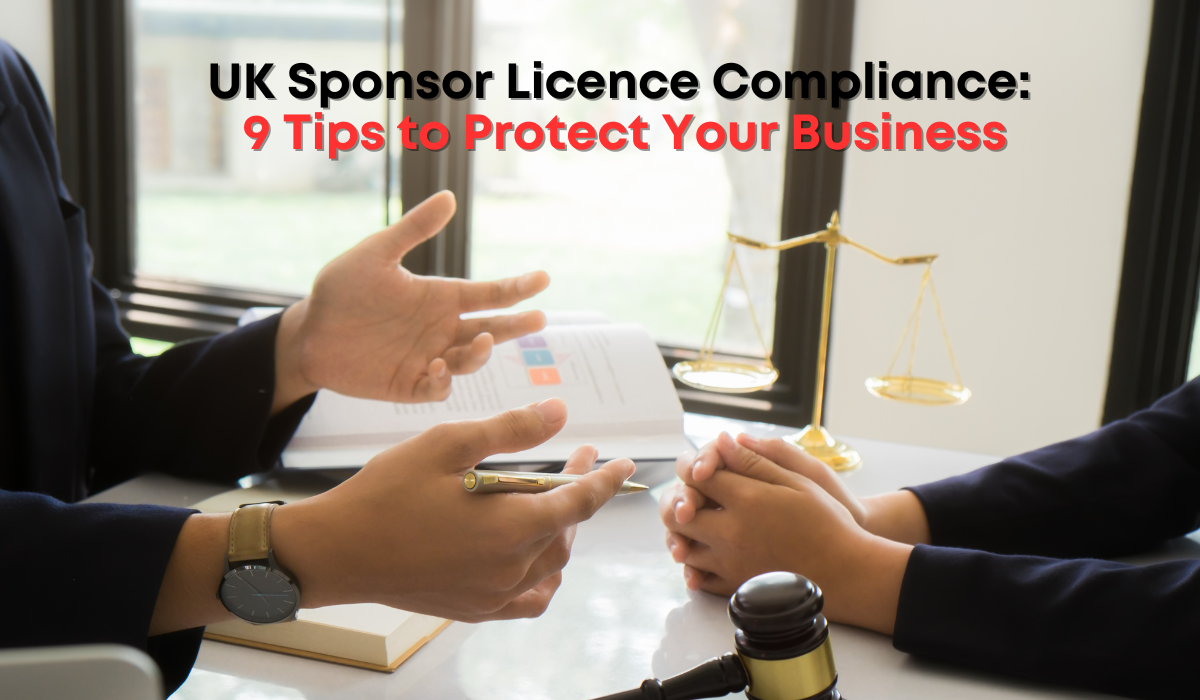Securing a UK sponsor licence to recruit overseas talent is a significant achievement for any business. However, obtaining the licence is just the beginning. Maintaining compliance with Home Office rules is crucial for UK businesses hoping to retain their sponsorship privileges. A misstep can lead to severe repercussions, from downgrading and suspension of the licence to visa curtailments for sponsored workers, or even the loss of the licence entirely. For business owners and HR teams alike, understanding and adhering to sponsor duties is essential to avoid potential penalties and ensure a steady flow of global talent. Below, we outline nine crucial strategies to help businesses meet UKVI compliance standards.
- Gain a Thorough Understanding of Your Sponsorship Duties
First and foremost, employers must be well-versed in their sponsorship duties. A UK sponsor licence comes with extensive responsibilities that extend beyond hiring. This includes maintaining accurate records, reporting changes to UK Visas and Immigration (UKVI), regularly verifying the immigration status of sponsored workers, and ensuring compliance with relevant laws. Even minor lapses can have major consequences, making it essential for business owners to have a hands-on understanding of these obligations. While delegating tasks is possible, it’s ultimately the directors’ responsibility to ensure the organisation’s ongoing compliance.
- Implement Updated Sponsorship Policies and Procedures
A key element of ensuring compliance is the establishment of detailed HR policies and procedures that specifically address sponsorship management. These policies should cover all aspects of sponsorship duties, including recruitment criteria, right-to-work checks, issuing Certificates of Sponsorship, reporting absences, and meeting record-keeping requirements. Importantly, these procedures should be reviewed and updated whenever immigration law changes to remain compliant. Making these policies accessible to all employees involved in sponsorship management will help maintain consistent and accurate practices.
- Invest in Training for Key Personnel
Without comprehensive training, even the most well-drafted policies may fall short. To foster adherence, it’s vital to provide initial and refresher training to the team, particularly to Key Personnel like Authorising Officers, Level 1 and Level 2 users, and Key Contacts. Training should also include contingency planning for situations where a Key Personnel member is absent. Regular training sessions ensure that everyone is prepared to comply with updated laws, and all processes run smoothly, even when personnel changes occur.
- Conduct Regular Mock Audits
To stay audit-ready, businesses are advised to conduct regular mock audits. UKVI often conducts unannounced checks to assess sponsorship compliance, and any discrepancies can lead to penalties. By enlisting an immigration solicitor to carry out mock audits, organisations can identify and rectify compliance gaps. External auditors, with a thorough understanding of UKVI’s requirements, can evaluate compliance levels and help organisations implement corrective actions proactively.
- Assign Responsible Key Personnel
UK sponsor licence holders must appoint designated Key Personnel to manage the Sponsorship Management System (SMS). Key roles include the Authorising Officer, Key Contact, and Level 1 and Level 2 users. Each individual in these roles must be suitable and trustworthy, meeting specific requirements such as being based in the UK. If any member of this team leaves the business, UKVI must be informed, and a suitable replacement appointed promptly to ensure continuous compliance.
- Maintain Comprehensive Records for Sponsored Workers
One of the cornerstones of sponsor licence compliance is meticulous record-keeping. UKVI audits often involve in-depth checks of sponsor records, meaning any inconsistencies or outdated information could lead to penalties. Key records that must be kept include sponsored workers’ contact information, visa status, entry records, national insurance numbers, recruitment processes, salary details, and skill levels. Regularly updating these records is essential to ensure compliance during any UKVI audit.
- Automate Checks and Reminders
Compliance can be time-consuming, but leveraging technology can make it manageable. Automated reminders and checks help ensure that important tasks, such as visa renewals, are not overlooked. By implementing an automated workflow, businesses can streamline recruitment and right-to-work verification processes, significantly reducing the risk of human error. Many HR systems allow the integration of compliance tools specifically designed for sponsorship management, which can ease the burden on staff while enhancing accuracy.
- Enforce Right-to-Work Checks for All Employees
Right-to-work checks are not exclusive to sponsored workers. All employees, including British citizens and those with settled status, must be verified. This requirement applies to various employment types, from permanent staff to contractors and volunteers. Conducting consistent right-to-work checks ensures that the organisation remains compliant with both sponsorship duties and broader immigration laws, providing an extra layer of protection during UKVI audits.
- Address Compliance Issues Promptly
In the fast-paced world of business, issues can arise. When problems occur, such as an employee’s prolonged absence without notice or a failure in the recruitment process, it’s crucial to act immediately. Addressing issues as soon as they are identified prevents minor issues from snowballing into larger compliance risks. An open and proactive approach to problem-solving within sponsorship management will help maintain a smooth operation and prevent any non-compliance from affecting the business’s ability to sponsor workers.
Final Thoughts
Navigating the complexities of sponsorship compliance may seem daunting, but with a robust framework of processes, training, and checks, businesses can build a foundation for long-term success. Regular reviews and updates are vital to staying aligned with UK immigration law, and having an immigration solicitor on hand ensures support in maintaining compliance. By investing in these steps, UK sponsor licence holders can confidently pursue international recruitment, knowing they have safeguarded their sponsorship licence and workforce.
For organisations looking to begin or continue sponsoring overseas talent, effective compliance practices are not merely a legal requirement—they represent a commitment to responsible and ethical employment. As the global economy grows increasingly interconnected, the ability to maintain compliance not only enhances an organisation’s reputation but also strengthens its position in a competitive market.
Get in touch: For a comprehensive understanding of your options or queries on UK immigration matters, contact GigaLegal Solicitors at 02074067654 or click here to book a no-obligation consultation with an immigration expert.


